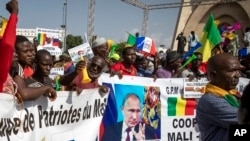On March 23, Bloomberg reported that the Russian private military company Wagner Group (Wagner PMC) is preparing to “scale back” operations in Ukraine and refocus on Africa.
Wagner Group head and Putin ally Yevgeny Prigozhin denied that.
On March 22, Prigozhin’s press office published a letter trolling U.S. Secretary of State Antony Blinken.
It called on the U.S. to give up efforts to “exert political influence in Africa and focus solely on the security that the Wagner PMC can provide.”
It then made this claim about the Wagner Group’s supposed positive influence in Africa:
“After the Wagner PMC and I started actively operating in Africa in 2017-2018, we managed to achieve great results in establishing security and order in every country where we were present.”
That is false. The Wagner Group has fueled instability in Africa through violence, corruption and political interference.
The Wagner Group, which the U.S. Treasury Department has called a “Russian Ministry of Defense proxy force,” has been present in Libya, the Central African Republic, Mali, Mozambique and Sudan, among other countries.
The Wagner Group’s modus operandi includes dropping into politically unstable countries to secure a share of lucrative mineral resources. It has done this in Africa’s Sahel region, which cover parts of Burkina Faso, the Central African Republic, Mali and Sudan.
A June 2022 report by the Combating Terrorism Center, an academic institution at the United States Military Academy in West Point, New York, stated that the Wagner Group “has little interest in genuine capacity building and instead seeks to capitalize and profit on insecurity,” employing “nefarious practices, including opaque and manipulative contracts, disinformation campaigns, election meddling, and severe human rights abuses.”
That poses “a severe threat to the security and stability of African states,” the report stated.
Take the Central African Republic (CAR), which has struggled with rebel militia factions for decades.
CAR and Russia have beefed up military ties since 2017, with the Wagner Group entering the country in 2018.
In return for securing gold and diamond resources in the country, the CAR government granted Wagner the right to conduct its own mining operations.
Analysts told the U.K.’s Guardian newspaper that they see greater instability “in the anarchic, resource-rich country” with Wagner’s presence than in previous years. A recent attack on Wagner forces in CAR resulted in seven to 17 Wagner casualties, rebel sources claimed.
On March 19, an attack on a gold mine run by a Chinese firm in CAR left nine Chinese nationals dead.
The Armed Conflict Location & Event Data Project (ACLED), a U.S. non-governmental organization, described the Wagner Group as “one of the dominant agents of political violence in CAR.”
U.N. experts have called on CAR authorities to end their relationship with the Wagner Group, citing reports that it has committed “systemic and grave human rights and international humanitarian law violations,” including torture, sexual violence and summary executions.
Wagner forces started operating in Mali in late 2021. French troops had for years fought Islamist forces in the country’s north, before pulling out in August 2022 following a public backlash. The Wagner Group played a part in that conflict, with Russia engaging in a propaganda campaign to bolster the image of its forces, while spreading disinformation to undermine France.
The Wagner Groups reportedly attempted to stage evidence of French atrocities, but it was the Russian contractors themselves who were frequently committing such “indiscriminate killings,” the Washington, D.C.-based Center for Strategic and International Studies wrote last year.
As in CAR, the Wagner Group has systematically targeted civilians in Mali.
“Civilian targeting accounts for 52% and 71% of Wagner involvement in political violence in CAR and Mali, respectively,” the ACLED reported.
Russian forces in Mali were implicated in the March 2022 Moura massacre, in which 300 men were executed.
The West Point report said the security situation in Mali worsened with the departure of French forces and the arrival of Wagner mercenaries.
Abuses against civilians have been used in jihadist recruitment efforts, although Wagner’s propaganda efforts have thus far been far more effective in winning public support.
Still, Binta Sidibe Gascon of Mali’s Kisal monitoring group told Agence France-Presse that in the wake of so many atrocities against civilians, “no territory is being retaken and sadly the situation is getting worse, with more displaced people, schools closed and a humanitarian crisis.”
A similar scenario is playing out in Burkina Faso, where French troops were asked to leave in January amid reports that the Wagner Group was moving in.
Once again, the Wagner Group will ostensibly help fight jihadists in exchange for gold mining concessions.
The three countries where the Wagner Group has or is set to intervene—Mali, Burkina Faso, and Sudan—have been suspended from the African Union (AU) for having military coups.
According to Peter Fabricius, a consultant at the Pretoria, South Africa-based Institute for Security Studies (ISS), Russia’s support for the military governments unconstitutionally installed in these countries, against the backdrop of its war on Ukraine, risk undermining “the AU’s ambitions to achieve stable governments and strong democracies.”
In Sudan and elsewhere, Wagner has allegedly engineered manipulative social media campaigns and interfered in elections.
Still, Wagner has also not always proven as adept at executing their Africa operations as their propaganda suggests.
Take Mozambique, whose northernmost province, Cabo Delgado, has been wracked by insurgent violence for years.
Wagner mercenaries arrived there in September 2019.
At the time, independent analysts told The Moscow Times newspaper that Wagner forces were struggling, facing ambushes and multiple casualties.
The Wagner Group ultimately failed to stabilize the situation jn Cabo Delgado.






